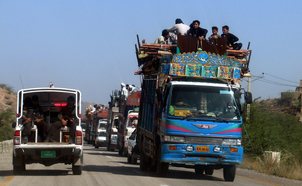Shahbaz Taseer, the son of Pakistan’s slain governor of Punjab province Salmaan Taseer, has given a chilling account of brutal torture during his half a decade-long captivity by ruthless Uzebk militants who flogged him, cut off his flesh and pulled out his nails.
The horrific ordeal was narrated by Shahbaz himself in his first interviews after he recently returned home in March from the clutches of the Islamic Movement of Uzbekistan (IMU) and later the Afghan Taliban.
“They used to flog me. I was flogged about 500 in three days, then they cut my back with blades and removed nails from my hands and feet,” the 33-year-old told BBC Urdu about his captivity by the IMU, an outfit long associated with Al-Qaeda blamed for high-profile terror attacks in Pakistan including the 2014 storming of Karachi airport.
He said he was not given food for days and was not given treatment even while suffering from malaria.
Once the captors also stitched his mouth.
“They used to torture me for making films and used to tell me their plans in advance. Like they would tell me that they will remove my nails tomorrow.
“I used to pray the whole night,” Shahbaz said.
“They would carve my back open with blades and throw salt. They sewed my mouth shut and starved me for a week. They shot me in my leg. They cut flesh off my back. I bled for seven days and they wouldn’t give me any help for seven days,” he told CNN in a separate interview.
Shahbaz, who was abducted in 2011 from his hometown Lahore, said he was initially kept in Mirali area of North Waziristan and them moved to Dattakhel area of same district.
Later, he was moved to Afghanistan by Taliban who imprisoned him in their jail.
He also said that differences cropped up between IMU – whom he described as known in militant circles for being “ruthless, merciless and the best fighters” – and Taliban over the issue of allegiance with the Islamic State (ISIS) group.
“Following the dispute, Afghan Taliban attacked the Uzbeks and eliminated their whole group – their leadership.
For three days, only death lived there,” he said.
Describing his survival as a “personal victory”, Shahbaz said patience and the hope of eventual release sustained him.
“People, friends and family say you are very brave, you came back, it was very heroic. But these are not things I can say about myself. What I can say about myself is that I learnt to be very patient.
“When the kidnappers would call my mother, it was not me speaking to her; it was them. I was just their vehicle. I knew she couldn’t speak freely either. But I learned to focus on her voice. I loved hearing her voice,” he said.PTI








